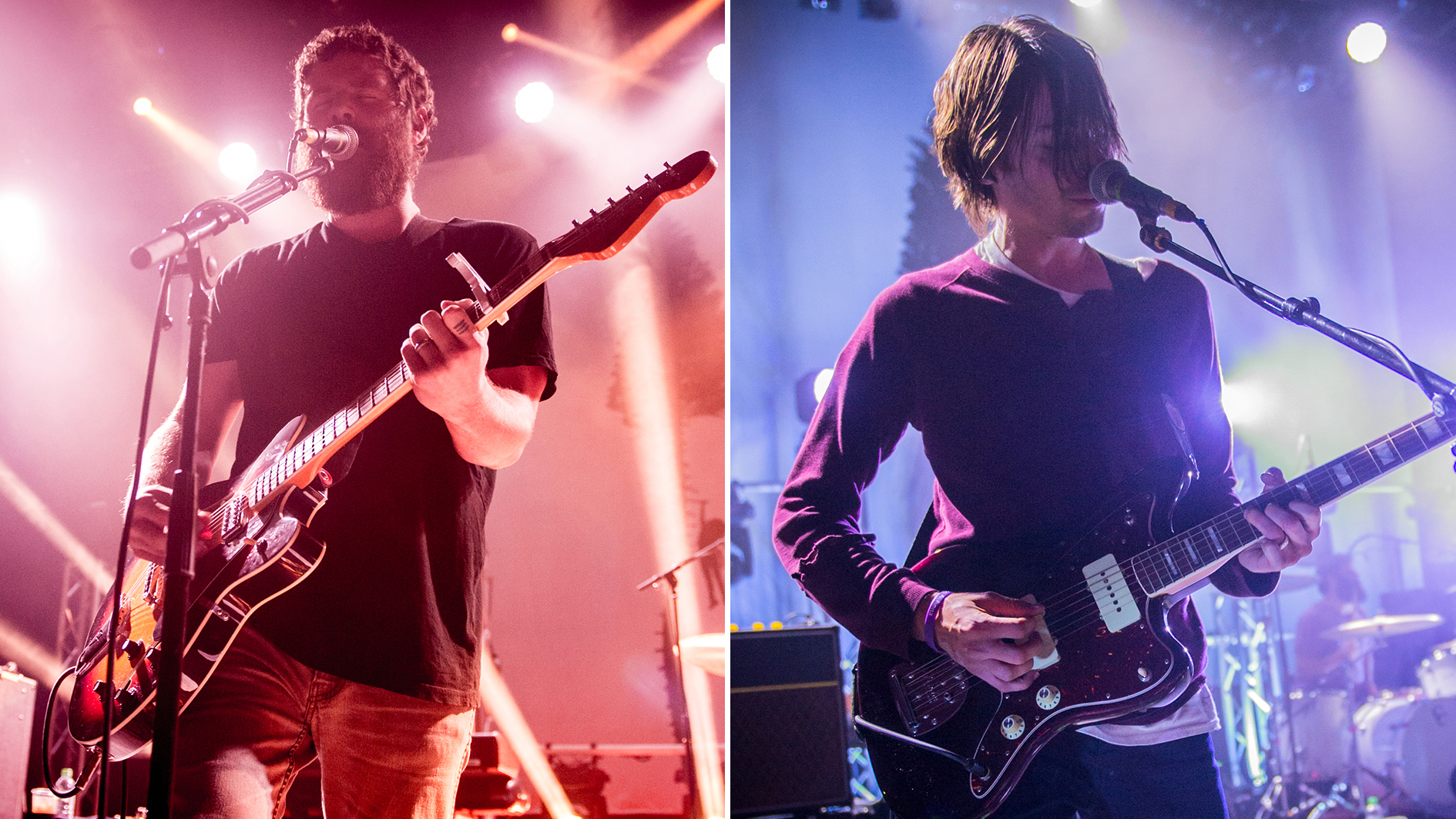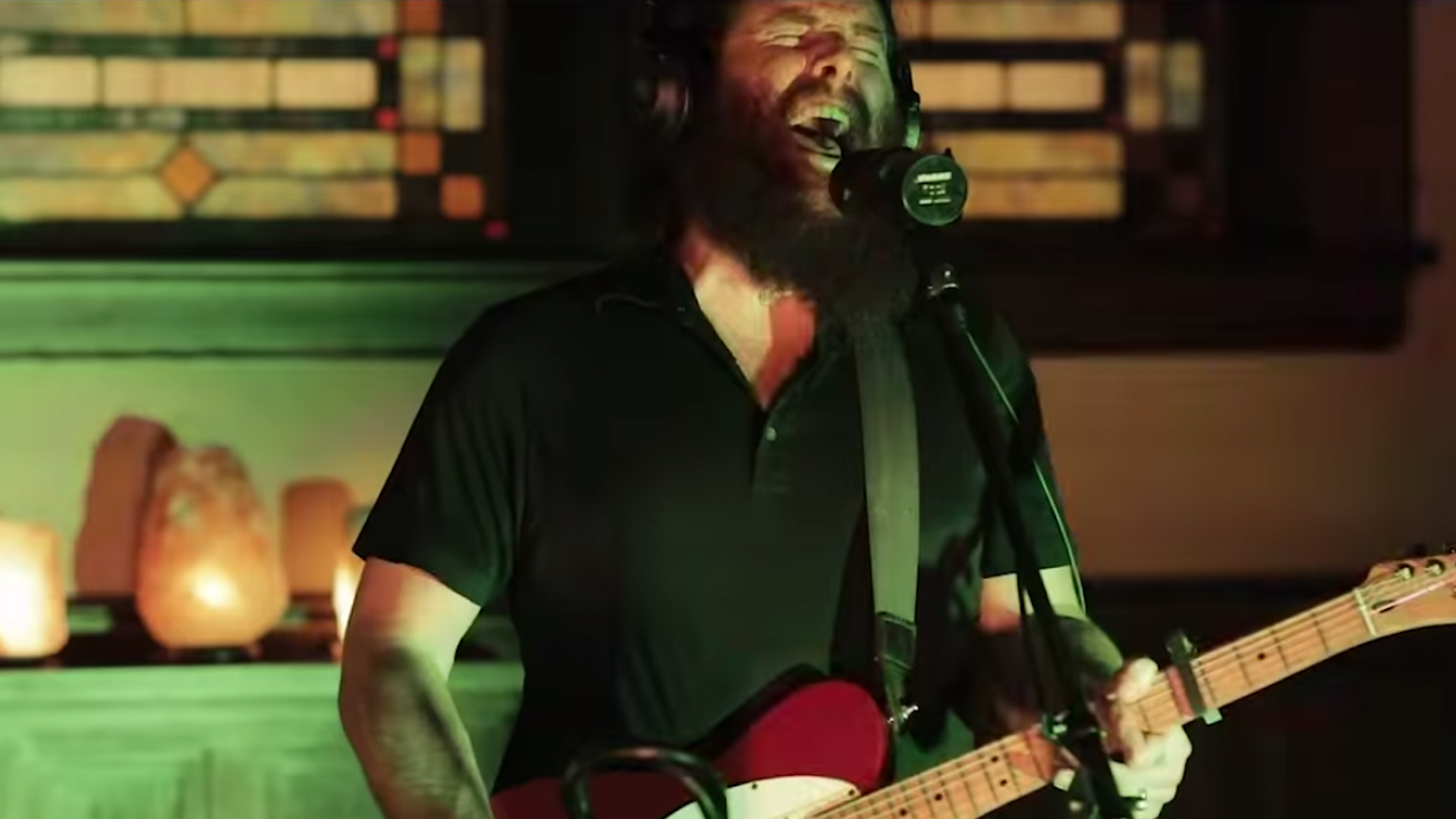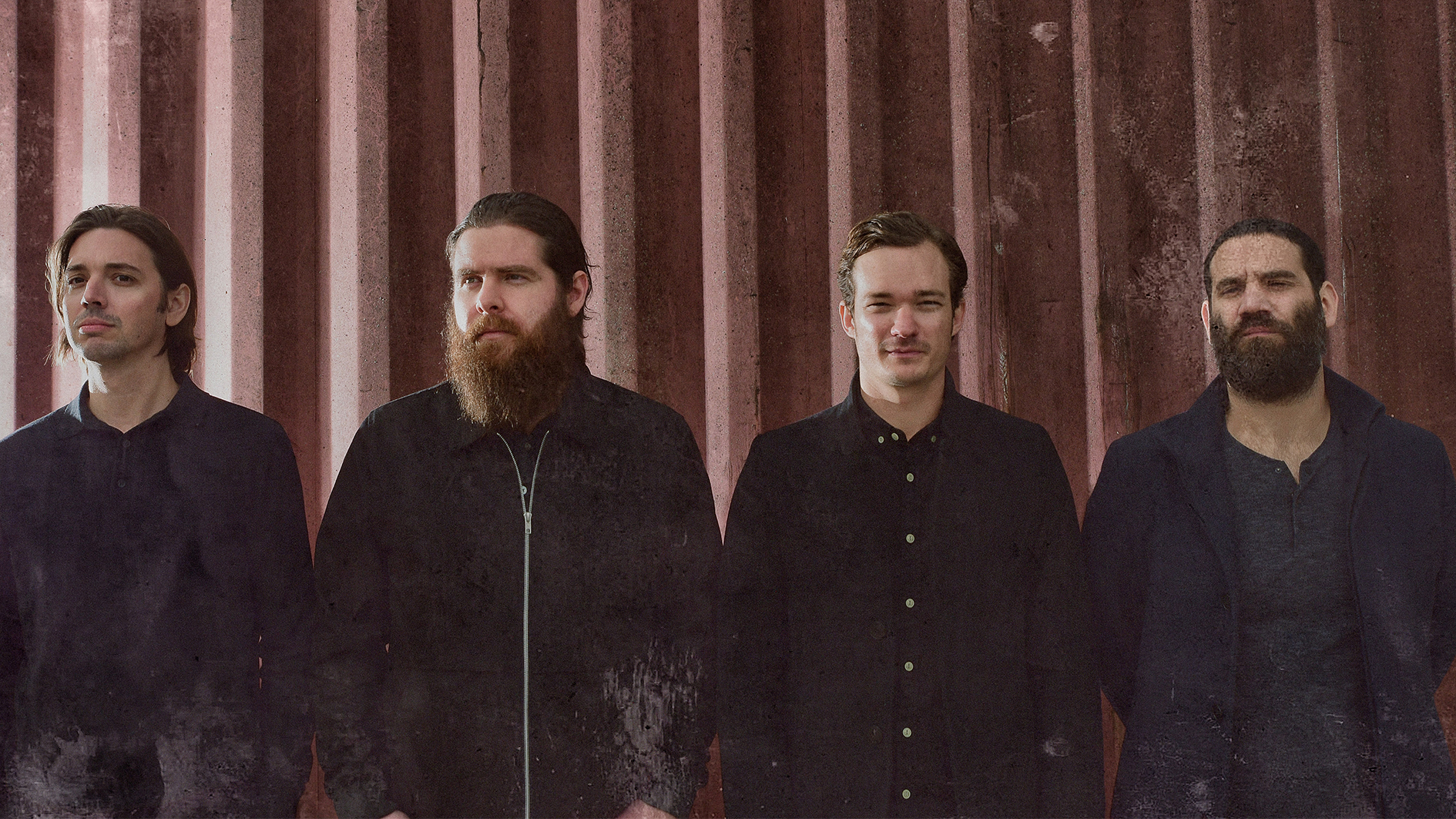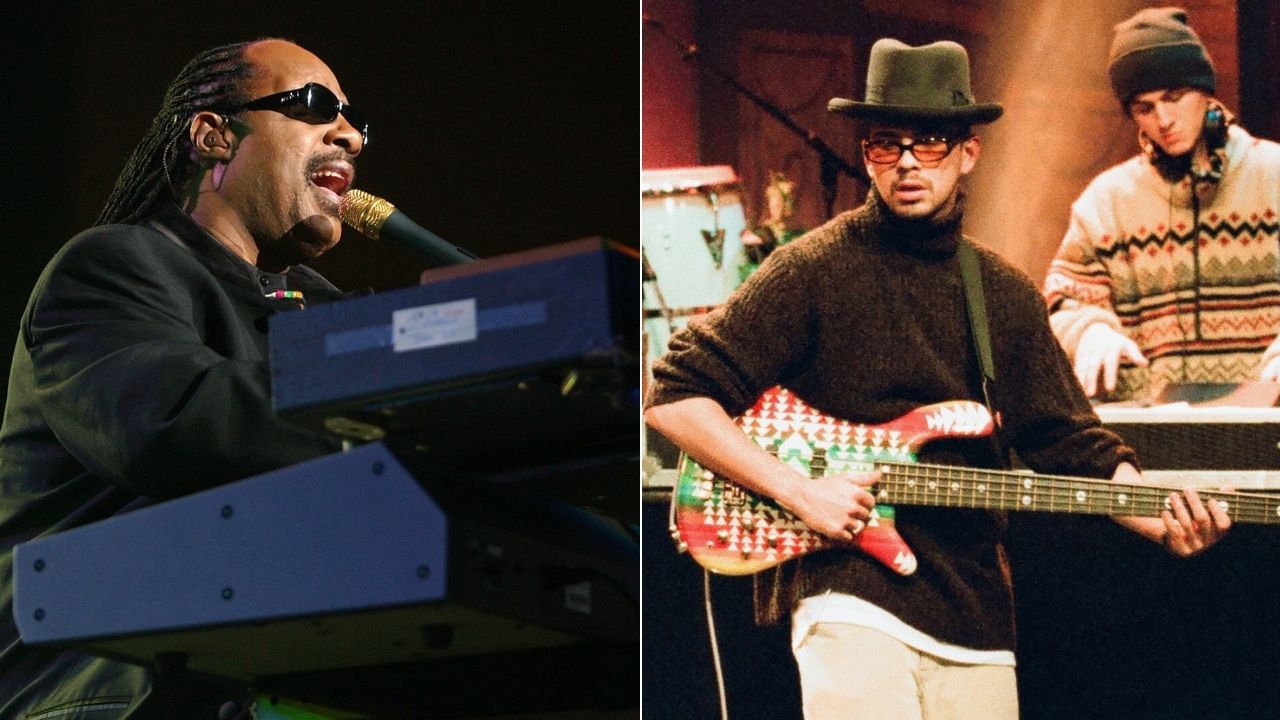Manchester Orchestra: “A song is never finished, it's abandoned. If it were up to us, we'd have worked on this record our entire lives!”
Rob McDowell and Andy Hull on how the full circle of life, loss and a very special Martin fed into their monumental new album, The Million Masks of God

Atlanta’s Manchester Orchestra have always been an indie rock band capable of both chunk and sophistication. Their 2017 record A Black Mile to the Surface showed their increasing ability to transform complex, layered arrangements and high concept lyrics into climatic and unpredictable rock songs, broadening the remit of an indie rock group in the process.
Their new album The Million Masks of God, though, created in the hardest years of the band’s life, goes even further, attempting to capture and map the arc of a full human life, all amid a melting pot of electronic and analogue instrumentation, ethereal samples and deep introspection.
It is a record inspired an indelibly shaped by the passing of guitarist Rob McDowell’s father – himself a guitarist, music enthusiast and enduringly positive influence on the tight-knit group – and the subsequent collection sounds noticeably more fond and reflective than bleak or forlorn.
We spoke to Rob and his brother-in-law Andy Hull, the band’s frontman and main songwriter, about the loss, lessons and limitations associated with The Million Masks of God.
The loss of Rob’s father became the central point of inspiration for The Million Masks Of God. When did it become clear that was going to be the case?
McDowell: “It was never an intentional decision. My dad was diagnosed with cancer in 2014. I found out it was stage four cancer in Germany on tour with the band, so a lot of those moments came when I was around those guys.
“They truly are my best friends so I was in no way not-sharing with them. It was just the theme of life at that time. We were all having kids and bringing new life into the world, but at the same time, another life is ending.
All the latest guitar news, interviews, lessons, reviews, deals and more, direct to your inbox!
“So I think it was circumstantial, rather than 'let's write about Chuck McDowell…’ But it is not a gloomy record in my opinion. It's the acceptance that it is something that happens, has happened and will happen to all of us.”
Hull: “Robert's also my brother-in-law. He's married to my sister, so there's even beyond being my best friend, there's a family closeness. I was writing about my life, seeing my friend go through that and it all sort of came to the boiling point moment, where it was like, 'Man this is probably his last few months here’.
“It ended up weaving a narrative throughout the album that is sort of a parallel to a human being's life. There was not a lot of positivity around there, other than making a record we all believed in.
“It was like we were afforded this opportunity to actually put our emotions and work into something that really turned into a tribute to the guy who was incredibly important in my life, obviously thousands times more in Rob’s.”
Not to minimize Rob's personal loss and experience, but we’re quite good at repressing emotions in the West. It seems it could easily have gone that way, but you were close enough that it was shared.
McDowell: “It was something where the faucet was either on or off, there were moments where all of us wept together and hugged each other, and really, I used this record.
“I said to my wife, 'You know, I'm so happy I didn't try to drink my way through this or use drugs or gamble, I decided to work. And that was how I took each step forward. It never stopped hurting, but, you get better at managing those emotions.
“My dad was a musician and I was able to make a couple of albums with him. I knew that the last thing that he would want to have happen is for that to affect [my ability to make] the music, so I wouldn't deny it.
“I was thinking about it constantly, but I chose to put all of that energy and all of those feelings into making something that I knew he would be proud of.
“I think you are right in that it is our natural instinct to deny or bury it, because in your mind that's a better way to deal with it, but in reality that is not true and I think that saying that out loud is something that people need to hear. It is horrible – and you have to talk about it.”
We wanted to make an organic electronic-sounding record, but it's always more about letting the sound dictate where you're going to go and following your instincts
Rob McDowell
Hull: “It was just so tricky, you just have no idea what to do, really. He is my roommate on the road and my brother. We're with each other every day and, if you see your friend breaking down, then you break down with them, you know?
“Then there were these moments where I would just forget entirely for like a six-hour span and then I would look at him and see he was off somewhere and think, 'Fuck... How are we here for him?’ But he was so open about all of it, it made it feel like we were a unit. We were experiencing this thing and he was OK talking about it.”
Was it clear from the beginning what you wanted this record to sound like?
Hull: “There was an idea of sonics I had in my head but they're always so vague [at the beginning]. But it was the idea of trying to clash different things together, something that gives that mentality of like channel changing on an old TV.
“We loved that idea, so then it was, 'Well how the hell do we do that!?' So we started clashing together electronics and sampling real things in the studio and figuring out where to place them, things like dropping a bag of acorns on a snare drum. All the creation of that was joyful.”
McDowell: “Or like Tim [Very], our drummer, played these V-Drums. I'm sure you and every other musician think, 'V-Drums aren't very cool.' But the goal was to take something that it wasn't cool and make it cool!
“So we wanted to make an organic electronic-sounding record, but it's always more about letting the sound dictate where you're going to go and following your instincts.”

What guitar gear were you leaning on the most during the sessions?
McDowell: “I used the same guitar for 99 percent of it. It's the Troy Van Leeuwen Jazzmaster. It's just a beautiful guitar and it's actually Andy's guitar. Andy got it and I got this Fender Coronado at the same time. We both immediately fell in love with the other person's guitar so we did a straight-up trade.
“So it was usually that through the Fender Deluxe head and a handful of Old Blood Noise pedals. But guitars, to me, I get weird with synth sounds and piano sounds and affecting the sounds but I want to play the guitar when I play the guitar, rather than overthink the tone!
I want to play the guitar when I play the guitar, rather than overthink the tone!
Rob McDowell
“So a lot of the parts were like 'I have the sound that I love right now, let's get it with this sound'. Then we can manipulate it [later, if need be].
Hull: “For me, I love that Coronado II from Fender and I would run that into a Super-Sonic head. I would do that for a lot of the rhythm stuff. A tonne of it was stuff that was not at all what I was planning on playing, but we wanted the energy to play it like we were in a club.
“Tim, when he drums, you feel like there's power there and space for Andy Prince on the bass to do his thing. So I tried to take a backseat in that sense and then have way more fun laying stuff over it afterwards, seeing what space was left and where it might fit. It's so fun, when it finally fits with those chunky chords, that's my favorite place to be.
“Then for recording, anytime we need to get kind of nuts, my red Tele is the guitar that we go to. Generally, we're going for direct-in on the really crunchy guitar stuff and re-amp it through a Space Echo and sort of build a tone, rather than use one particular thing.”

What about acoustics?
McDowell: “Well, when my dad passed he left god-knows-how-many guitars. I went into the closet of his room and he had this Martin case that I'd never seen and I pulled it out and it's this three-quarter-sized prototype Martin that he'd bought that I had never seen and I've never played.
“It was one of those things where you pick it up and it sounds special and you love it. So I immediately told my mom that I was stealing it! And that has been my acoustic guitar for the past few years.
“That's the guitar that's floating around the house that I'm hiding from the kids. It is the first acoustic that has inspired me to want to play more acoustic since I was a child.”
Hull: “Yeah, I really like how the acoustics sound on this record. Catherine Marks [co-producer] did a great job, but there's just an unbelievable feeling to playing that guitar on this record. It was so light.
“It really felt like you could throw it fifty feet in the air. But then you would play it and the intonation was perfect and the action was perfect. You just felt like you were in Fleetwood Mac or some shit. It was this sparkly, gorgeous tone. You'd just play a D chord and you'd already sound amazing.”
What are your favorite guitar moments on the album?
McDowell: “I think my favorite guitar song and my least favorite guitar song to play would be Keel Timing that just came out. Because it is it basically Andy [Hull], Andy Prince [bass] and I all playing different rhythms.
“It makes us want to go drive for some reason. But the ‘tika tika tika tika tika’ part is miserable to play for four and a half minutes! So when it finally opens up to the big riff section after the chorus, it is it's a much needed relief on my hands. So: love the song, hate playing the song!”
Hull: “I really love the outro of Angel of Death. It’s this weird dark electronic thing, and I'm just playing this one note on the E-string over and over. It's just super unsettling, but it takes up a tonne of room and I'm going against the song but it really works well. I love that moment.”
How did you navigate that sense of wanting to honor Rob’s dad and the enormity of the topic vs your limitations as a writers and musicians? How could you tell when it was enough? When it was done?
McDowell: “We learned a statement on this record that [co-producer] Ethan Gruska told us. He was referring to mixes, but I truly feel like it applies to all art in general: 'a song is never finished, it is abandoned.' If it was up to me, I would work on the same record for my entire life, just tinkering and progressing.
I find myself hoping that this is an epic tribute to Rob’s dad. I know that this would make him extremely happy
Andy Hull
“But there's a moment where you literally just have to know that you're done. It is a snapshot of what you knew at that time. You will continue to change and you continue to grow, but this record will always represent this time in life and you can't fault yourself for only knowing what you knew at that time.”
Hull: “For me, there's something sort of nice about it when you're dealing with topics that are so large, because it felt there weren't really rules or limits to it.
“I like that side of it, the enormity of it, because it's like, 'What? Am I going to be wrong about what happens after you die?' Of course, I'm going to be wrong! I don't think there is anybody who has that thing figured out.
“The other side is really feeling like I had to be honest and connecting to what I was saying. I didn't ever want to feel like I was trying to use a tragedy as some sort of sick inspiration.
“We didn't speak about what all this material was about for a long time. It was just to sort of an understood thing, so there was definitely a fear for me, but when we finally were able to discuss it, he was just so generous. He said, 'I know… I've been listening to you write songs for 15 years. I know what you're talking about.’”
“So I find myself hoping that this is an epic tribute to Rob’s dad. I love that we got to put him on the cover of the album. He was a showy dude, in the best way. He was a huge personality and played shows all the time and loved music. I know that this would make him extremely happy.”
- The Million Masks of God is out on April 30 via Loma Vista Recordings, and available to preorder now.

Matt is Deputy Editor for GuitarWorld.com. Before that he spent 10 years as a freelance music journalist, interviewing artists for the likes of Total Guitar, Guitarist, Guitar World, MusicRadar, NME.com, DJ Mag and Electronic Sound. In 2020, he launched CreativeMoney.co.uk, which aims to share the ideas that make creative lifestyles more sustainable. He plays guitar, but should not be allowed near your delay pedals.
